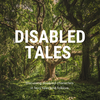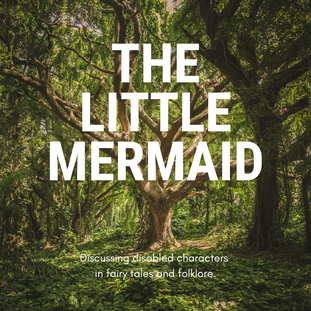Andersen’s The Little Mermaid: ‘if you take away my voice, what is left of me?' by Scarlett Ward3/3/2022 In Andersen’s The Little Mermaid, emphasis is placed upon how she lost her beautiful singing voice in return for legs which makes walking feel as though “a swords were passing through” her, all for a life so very different from her own. Hans Christian Andersen unwittingly tells the story of my relapse into Multiple Sclerosis and Bulbar Palsy. Having speech robbed, understanding of the written word swim before your eyes like being under water, and yes, every step of learning to walk again is like walking on knife point. Multiple Sclerosis is a progressive disease where your own immunity attacks your nerves. Something I didn’t know I had until suddenly my able body of 28 years collapsed, and I found myself in this state of The Little Mermaid, with a life I hardly recognised. Han’s mermaid asks, “but if you take away my voice what is left of me?” It is a question I find myself asking every day. As a poet, a performer, a workshop facilitator, my identity is in voice. I struggled to come to terms with who I would become without it. Although my speech has returned, it is impeded, I have found that I demand more time and patience from who is talking. Whilst before I was quite anxious about making myself heard, it’s as though I had to lose my ability to speak to gain enough confidence to talk to people. I demand space and I don’t tolerate interruption, no matter how well-meaning they are. I had a lot of internalised ableism about “sounding stupid” to work through, partly because of preconceived ideas of perfectionism within myself. That question “what is left of me?” is answered by my writing, my ability to live life every day despite my illness, my love of animals and family. I had to stop counting things I couldn’t do and start being grateful for things I can. There is a bloody lot left of me actually, even if I never fully get my speech back. What has emerged had been stubbornness, determinedness, and an unwillingness to quit. A week ago I couldn’t write, now I am writing an essay an using my voice. Those who know me will tell you this comes as little surprise. Andersen’s mermaid looked at her prince “sorrowfully with her deep blue eyes but could not speak” and is pitiful, described as a “foundling” or a “child.” What I find so compelling about Andersen’s mermaid is how she is infantilised, agreeing to dance on feet that are “bloodied” because she wanted to impress her prince. Rather than being someone who deserved pity, I bared my teeth and I climbed those stairs, I told my physio “again” when I reached the end of the corridor. The way that disabled people are treated in folklore as something to be pitied is so misplaced. I would rather drown under an ocean than allow anyone to feel sorry for me, because there is so much left of me than what my disability took away.
0 Comments
|
Disabled TalesDiscussing disabled characters in fairy tales and folklore! Categories
All
Archives
June 2023
|


